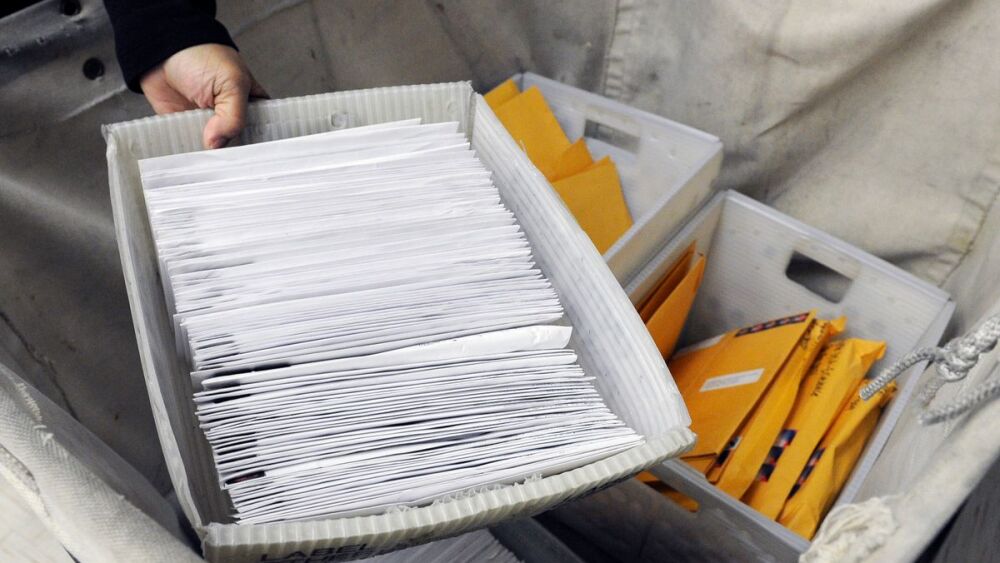By Noelle Crombie
oregonlive.com
PORTLAND, Ore. — Mail sent to Oregon prisoners is about to get less colorful.
That’s if Department of Corrections officials adopt a slate of proposed rules cracking down on crayons, markers and greeting cards. If approved, the rules would allow only typed mail or handwritten letters in pen or lead pencil.
Greeting cards, long a staple of prison correspondence, won’t be allowed.
Cheerfully colored envelopes? Also out. Under the rules, only white envelopes would be permitted.
The proposed crackdown comes as Oregon confronts a tide of drugs entering its dozen prisons — often through the U.S. mail. Prison officials have detected street drugs in crayon markings and markers, soaked into card stock and colorful envelopes or slipped along envelope seams of the nearly 1 million pieces of mail sent to Oregon prisoners each year.
“The landscape has changed with fentanyl and other drugs that are being liquefied and inserted into mail systems,” said Department of Corrections Director Mike Reese . “It’s so easy to disguise. It just creates a level of safety and concern that we didn’t see 10 years ago.”
Figures from urine analyses have shown steep increases in drug use among prisoners in Oregon.
This year, the state began monitoring prison wastewater to better understand the scope of drug use and which drugs in particular are getting in. An agency spokesperson said Monday that the data from that effort, which costs about $144,000 a year, won’t be available until next week.
Nationally, some state prison systems now scan incoming mail and make the images available to prisoners through department-issued tablets — a shift Reese said Oregon will consider.
The proposed rules got a hearing Monday, when prison reform advocates and a handful of members of the public with incarcerated loved ones spoke against them.
Zach Winston, director of policy and outreach for the Oregon Justice Resource Center, which advocates for improved prison conditions, said the rules threaten successful prisoner rehabilitation and reentry.
“Lack of contact with loved ones makes it more difficult to cope with life in prison, to maintain hope that fuels rehabilitation, and to plan for returning to the community,” he wrote in a letter to the agency.
The American Civil Liberties Union of Oregon agreed, telling the state in a letter that the restrictions “raise freedom of speech concerns.”
“The new rules as proposed would limit the communications between families, children and their loved ones” in prison, wrote Mariana Garcia Medina, a senior policy associate.
Meanwhile, some in Oregon are encouraging policies that would expand communication between prisoners and their families and friends. A new report from Adrian Wulff, the state’s corrections ombudsman, said the state should allow free calls in prison to reduce the financial burdens on families and enhance ties between incarcerated people and their loved ones.
Five ways to implement effective mail screening as part of a comprehensive interdiction strategy:
Robert Kelley said cards and drawings offered a lifeline in prison.
Kelley, 52, whose sentence of life without parole was commuted last year by then-Gov. Kate Brown said the card and drawing his niece and daughter sent earlier in his incarceration helped change his life.
His daughter sent a card showing a rabbit hugging a heart — “like, dad, this hug’s for you,” he said. His niece sent a drawing showing Kelley as part of a stick figure family.
“It was her telling me, Uncle Robert, you have to stay out of trouble,” he said. “And that’s basically what got me to start turning around. She didn’t understand life without parole, but she understood getting in trouble.”
He said getting a card in prison could turn his day around.
“When you get those inside, that’s basically like a hug,” Kelley said.
Both now hang on his refrigerator.
Cornelius Davis, 52, said mail represented a bright spot in an otherwise bleak place.
“It got me through those rough times when it didn’t seem like there was any light at the end of the tunnel,” said Davis, who was paroled last year after a nearly 28-year stretch. He lives in Portland.
He said prisoners picked up mail from a guard station or it would be slipped under their cell door. Sometimes, prisoners return from their prison jobs to find a corrections officer had left the mail on their bunk.
“The best thing ever is getting off work, going back to your cell — maybe you had a crummy day — and then you get back and there’s a letter on your bunk and the writing is the writing of a child that somebody helped write their name on the envelope,” he said.
“It’s one of those feelings that is invaluable,” he said. “You cannot put a price on that.”
The public may submit comments on the proposed rules through 5 p.m. on Sept. 25 . Comments may be sent to the Oregon Department of Corrections , 3723 Fairview Industrial Drive SE #200, Salem, OR, 97302, or by emailing DOC.RulesCoordinator@doc.oregon.gov.
Reese said the agency will review the public feedback. Agency administrators will then make a decision after consulting with Gov. Tina Kotek’s office. Reese said he expects the process to be completed by the end of the year.
—
©2024 Advance Local Media LLC.
Visit oregonlive.com.
Distributed by Tribune Content Agency, LLC.





